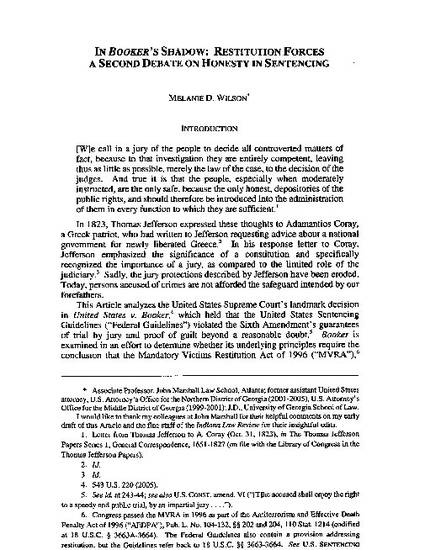
The Supreme Court's January 2005 decision in Booker should induce Congress to enact legislation to remedy the constitutional invalidity of the MVRA and encourage the Department of Justice to revisit how restitution is charged, indicted, negotiated in plea agreements, proven at trial, and presented at sentencing hearings. The Booker decision is also a reminder to lower federal courts to adhere to the rule announced by the Supreme Court in Hughey v. United States, which limits the reach of orders of restitution. Congress, DOJ, and the federal courts should insist on candor in charging and sentencing to remedy the restitution roulette that has generally accompanied a defendant through the federal sentencing process, a process which violates the Sixth Amendment and defies Rule 11 of the Federal Rules of Criminal Procedure. Restitution has been treated by sentencing courts as a post-conviction "afterthought." Because the courts have treated restitution as a secondary matter, defendants have routinely pled guilty with no understanding of what they might face in restitution. Sentencing judges have ordered defendants to pay restitution to victims not identified in the indictment or information and in amounts not alleged in such charging documents. The Eleventh Circuit has even ordered a defendant to pay restitution for conduct that occurred beyond the statute of limitations. These practices are analogous to those sentencing practices the majority condemned in Blakely v. Washington, "in which a defendant, with no warning in either his indictment or plea, would routinely see his maximum potential sentence balloon. At a constitutional minimum, a defendant has a right to know the maximum sentence he faces, whether incarceration or restitution, when he goes to trial to defend himself and/or when he enters a plea under Rule 11 of the Federal Rules of Criminal Procedure. Restitution, like other forms of punishment, should never be arbitrary or unpredictable.
